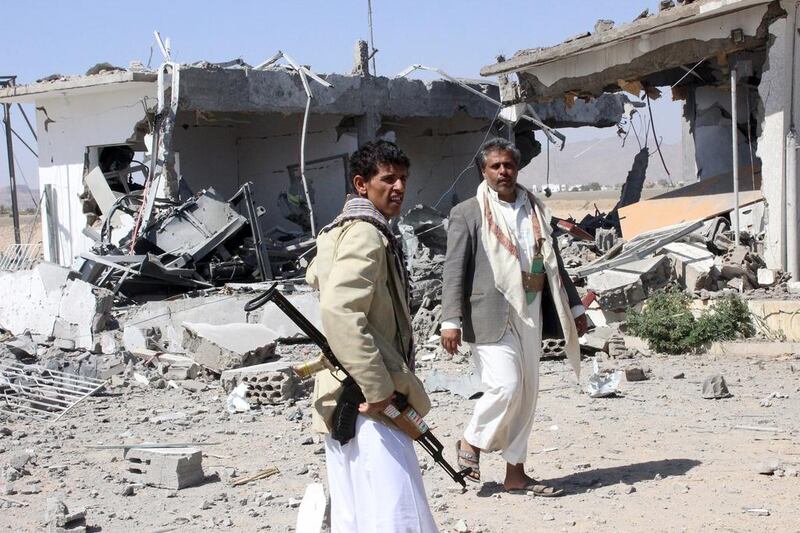SANAA // Yemen’s Shiite rebels and forces loyal to the former president launched a fresh offensive on Monday against the city of Aden as King Salman said Saudi Arabia was open to a meeting of Yemeni political parties.
His call came as an attack on a displaced persons camp in a northern rebel stronghold killed 40 people. The rebels, known as Houthis, said the deaths came from an airstrike by the Saudi-led coalition. Yemen’s foreign minister however blamed Houthi artillery.
King Salman told a cabinet meeting that Saudi Arabia would be open to a meeting of all Yemeni political parties willing to preserve the country’s security and stability.
Such a meeting must be “under the umbrella of the Gulf Cooperation Council in the framework of preserving legitimacy”, King Salman said in a statement reported by the state news agency SPA.
The conditions for the talks would include returning weapons to state authorities and not threatening the security of Yemen’s neighbours, it added.
Despite five days of airstrikes against Houthi positions, the rebels continued their offensive on Aden yesterday, shelling it and battling local militias, but were pushed back by at least two airstrikes.
Aden was declared the provisional capital by President Abdrabu Mansur Hadi before he fled the country last week.
The Houthis overran the capital Sanaa in September. They are backed by Iran and allied with former president Ali Abdullah Saleh, who stepped down following a 2011 Arab Spring uprising but has maintained influence through loyalists in the security forces.
Yemeni security officials said the combined force of Houthis and Saleh loyalists is positioned about 30km east of Aden, near the southern city of Zinjibar. The rebels have used artillery to target pro-Hadi militias known as the Popular Committees. Battles were also underway near the airport.
Emboldened by the air strikes, the Popular Committees have largely held their ground in Aden province and still control most of the city.
Warships from the coalition joined the battle to save Aden, shelling a column of Houthi fighters as they tried to advance on the city of Aden on Monday, residents said.
They said the vessels were believed to be Egyptian warships that sailed last week through the Suez Canal toward the Gulf of Aden. Egypt is a member of the Saudi-led coalition that also includes the UAE and Kuwait. Yesterday, Pakistan’s defence minister said it had not yet decided whether to send troops to Saudi Arabia but “if Saudi Arabia as a state comes under threat we will surely protect it”.
The death toll in Aden since the air strikes began on Thursday has reached 86, with some 600 people wounded, according to Abdel-Nasser Al Wali, head of a local medical centre in the city.
Meanwhile in Sanaa, a series of air strikes shook the city overnight and early Monday morning. The strikes have targeted militants, jets, air defence systems and Scud missile launch pads that could threaten Saudi Arabia.
Later in the day, the officials said aircraft struck areas near the presidential palace in Sanaa.
There were differing accounts of the attack on the Al Mazrak camp in Hajja province in the north-west.
The International Organization for Migration said 45 internally displaced people were killed and 65 wounded. IOM spokesman Joel Millman said the organisation had 75 staff on hand assisting the victims.
However, witnesses told the Associated Press that the camp was used to house displaced people from a conflict that ended five years ago and is now occupied by Houthi forces and that most of those killed were fighters.
Earlier Doctors Without Borders said 15 dead bodies and 30 wounded were taken to a hospital where it operates near the Al Mazrak camp.
MSF’s Middle East programme manager Pablo Marco said 500 new families had arrived at the camp over the past two days.
Speaking in Riyadh, Yemen’s foreign minister Riyadh Yaseen denied the attack was linked to the Saudi-led military operations and said it came from “artillery strikes” by the Houthis.
The daily airstrikes have created a climate of anxiety and uncertainty in Sanaa. Schools are shuttered, residents are staying indoors, and hundreds have fled to the safety of nearby villages.
Leaders meeting in Egypt for a two-day Arab League summit unveiled plans on Sunday to form a joint Arab military intervention force – setting the stage for an escalation in the conflict.
So far the strikes have targeted eight out of Yemen’s 21 provinces. Since the air campaign began, the Houthis have arrested about 140 foreign nationals on suspicion that they are providing the Saudis with intelligence on the locations of army barracks, radars and air defence positions, according to the rebel-controlled interior ministry.
Meanwhile, nations have been rallying to evacuate their nationals from the country,
A Chinese naval flotilla, which had been carrying out antipiracy escort missions in the Gulf of Aden and Somali waters, was sent to Yemen on Sunday to evacuate Chinese nationals. More than 500 Chinese citizens have been evacuated over the past two days, China’s defence ministry said.
About 4,000 Indian nationals have been caught up in the conflict, more than half of them working as nurses. India’s foreign ministry said it was attempting to airlift nationals from Sanaa. Eighty Indians were flown out on Sunday to Djibouti and 400 were being evacuated by sea from Aden and would reach Djibouti on Tuesday.
Associated Press, Reuters and Agence France-Presse





